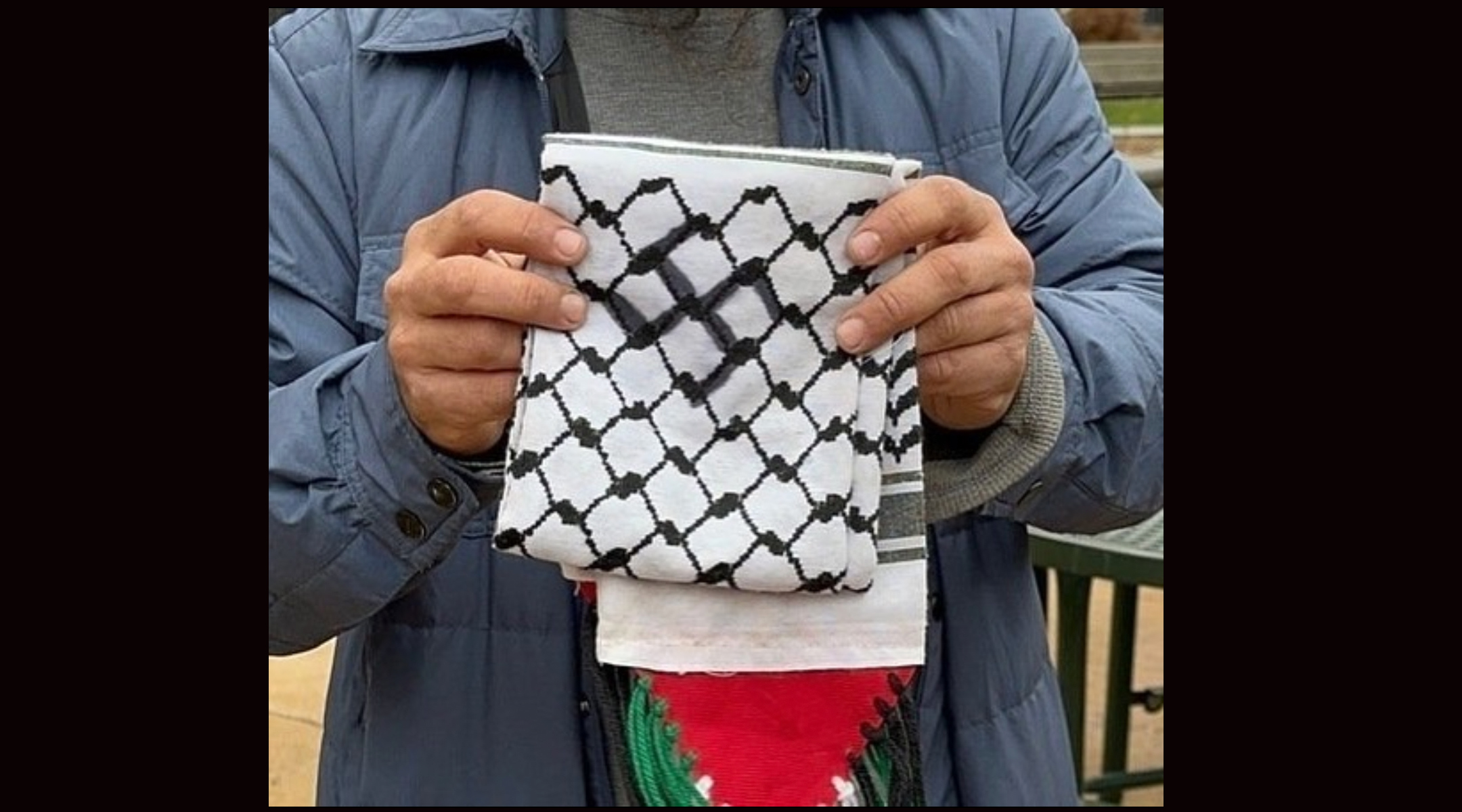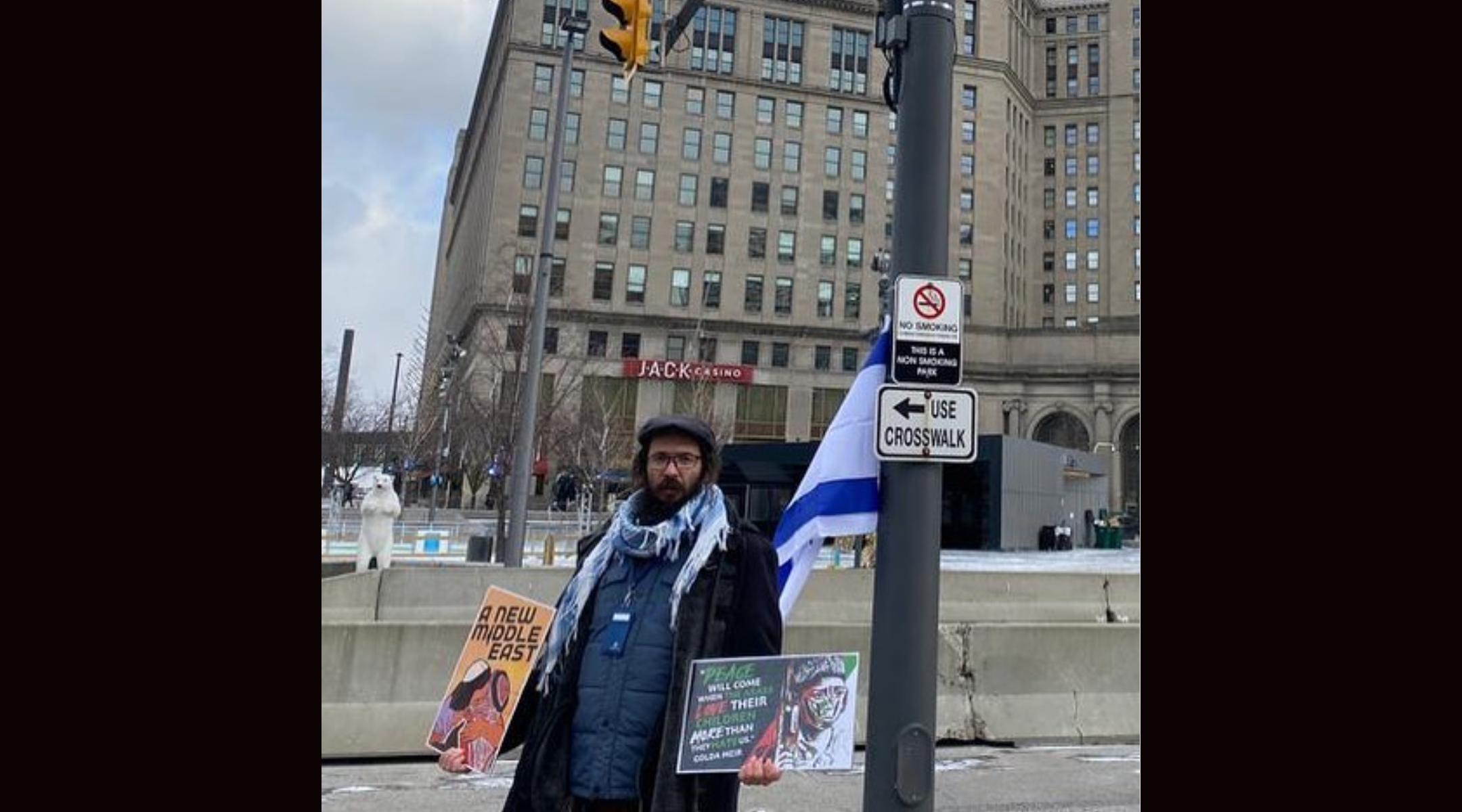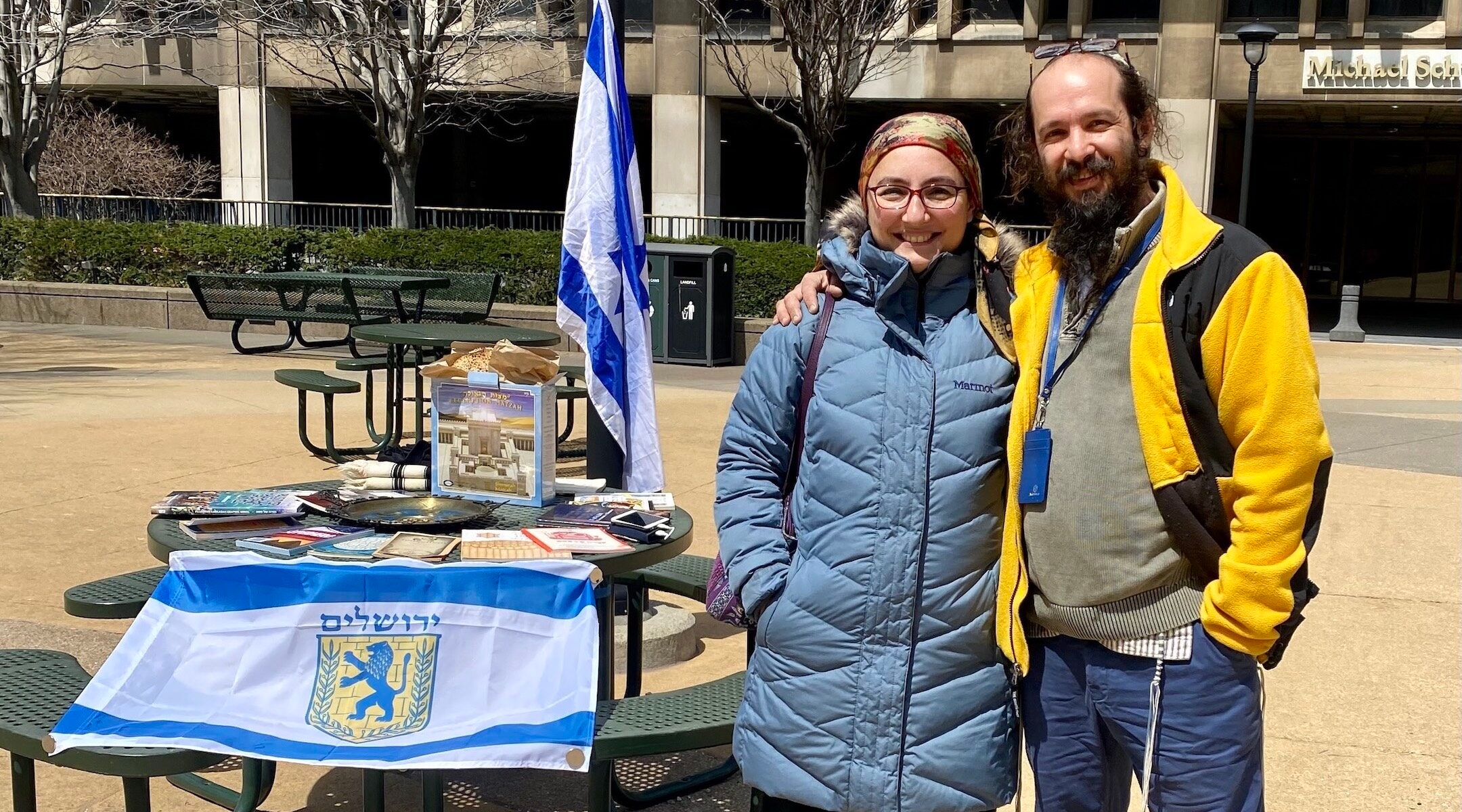(JTA) – For days, students and police at Cleveland State University had been trying to figure out who stole a banner belonging to a campus Palestinian rights group.
The banner, which belonged to the student group Palestinian Human Rights Organization, read “CSU Solidarity for Palestinian Rights” and was illustrated with an outline of Israel, the West Bank and the Gaza Strip collectively emblazoned in the Palestinian flag. A dove holding an olive branch appeared on top of the image.
Then, on Jan. 19, police charged their top suspect: a local Orthodox rabbi, whose presence on campus had become all too familiar. A few days later the man confessed to the theft on Instagram, announcing that he had stolen the banner from the school’s student center “as an act of civil disobedience.”
“This incitement to annihilation of Israel should have never been permitted at CSU,” Rabbi Alexander Popivker, a 46-year-old Cleveland Heights resident whose neighborhood is six miles from the school, wrote on social media accompanied by a picture of the flag he stole.
It was far from Popivker’s only recent run-in with local university students.
A handyman and part-time rabbi for a Russian-speaking Jewish community, Popivker has become known around town as a vigilant and omnipresent pro-Israel advocate. He can often be spotted counter-protesting at local pro-Palestinian demonstrations, or putting on displays of his own, with his wife Sarah on hand filming every contentious encounter. Before moving to Cleveland, the Popivkers operated what they called Chabad outpost in Naples, Italy, though he was never an official emissary of the Orthodox movement, according to a Chabad-Lubavitch spokesman.
One major theme of his protests, and his worldview, as he explained to the Jewish Telegraphic Agency: “Palestinians and Nazis are the same thing.”
For the last year, Popivker had been making weekly trips to Cleveland State, occasionally accompanied by other students or community members, to give public demonstrations that elaborate on that idea — sometimes with the aid of swastika-emblazoned props. In the early going, the university provided him with police protection and said his visits to campus were protected by free speech laws.
But he also sought out students online and in-person whom he deemed to be “brainwashed” by anti-Zionist messaging. One such online campaign against a law student prompted the student to file an order of protection against Popivker last fall, an order supported by a prominent Jewish dean at the university. Popivker promptly violated the order by returning to campus.

Cleveland State University main campus, Cleveland, Ohio. (Getty Images)
In late January, university authorities had enough. They arrested Popivker and, following a hearing, declared him persona non grata on campus, banning him from the university grounds for at least two years. Popivker has also been banned from nearby Case Western Reserve University, where he had advocated before focusing on Cleveland State.
In the midst of a nationwide university climate in which pro-Israel advocates claim Jewish students face regular antisemitic harassment for their real or perceived Zionist beliefs, here was a documented case of the opposite: a Jew and outspoken Zionist, who has no affiliation with the schools at which he advocates, accused of harassing anyone he perceived as a threat to Israel, including students who had never sought him out directly.
The Ohio chapter of the Council on American-Islamic Relations has spoken out numerous times against Popivker and praised university police for arresting him; a petition the group backed, labeled “Stop harassment on campus” and mentioning Popivker by name, has garnered close to 700 signatures.
Jewish groups, including civil rights groups, have been less forthcoming about the situation. Hillel International declined to comment for this story, and the directors of Cleveland’s regional American Jewish Committee and Jewish Community Relations Council offices did not return requests for comment. Jewish on Campus, a nationwide university antisemitism watchdog group that tracks what it defines as anti-Zionist social media harassment of Jewish students, also did not return a request for comment.
Jared Isaacson, the executive director of Cleveland Hillel, told the Jewish Telegraphic Agency that the center was “not very familiar with this story.” Cleveland Hillel coordinates Jewish student life at a consortium of Jewish universities including Cleveland State and Case Western, where its student center is located, as well as at least one other school where Popivker has made his presence on campus known in some form.
But, Isaacson said, “Cleveland Hillel is deeply committed to countering antisemitism and hate in all forms, and we believe that no student — Jewish or otherwise — should ever feel threatened or intimidated because of their identity.”
Popivker says he has support from the New York-based Lawfare Project, which bills itself as an “international pro-Israel litigation fund.” He told JTA that the organization “is watching over my cases and providing guidance.”
In a statement, the Lawfare Project called Popivker “a Jewish civil rights activist” but did not confirm that it is backing him, saying only that the group is “currently reviewing the matter.”
The group, which frequently files lawsuits on behalf of students who allege antisemitism on their campuses, said in a statement to JTA that the order of protection was a “double standard” that “should be alarming to anyone who cares about the fight against Jew-hatred.”
Lawfare recently settled a multi-year lawsuit with San Francisco State University over student reports of antisemitic harassment on campus stemming from anti-Zionist activists disrupting an event featuring the mayor of Jerusalem. The settlement compelled the university to hire a coordinator of Jewish student life.
Popivker could have his work cut out for him if he fights the charges. He had exhibited “behavior detrimental to the university community” by stealing the Palestinian banner and separately affixing an Israeli flag to university property, Matthew Kibbon, Cleveland State’s associate vice president of facility services, wrote in the university’s decision declaring him persona non grata.
The rabbi “was not banned for the content of his speech, but how he chose to exercise it,” a Cleveland State spokesperson told JTA in a statement. The university also provided JTA a list of recent campus police interactions with him, including the initial Jan. 11 report of the banner’s theft; Popivker’s visit to campus on Jan. 18, during which police advised him that the student’s order of protection did not permit him to be there; and his return visit on Jan. 25, during which he was arrested.
From Popivker’s perspective, he is simply speaking out on Israel’s behalf for a campus that has a large pro-Palestinian activist presence but few Jewish students. (There are fewer than 200 Jewish undergraduates on Cleveland State’s campus out of 11,784 students, according to Hillel International.) His goal is to educate, he says, informed by his status as a Jewish refugee from the Soviet Union. And he believes he is being targeted by local pro-Palestinian activists, who, he said, have gone after his kippah and Israeli flags.
“I never attacked anyone. I never raised my hand up to anyone,” he told the Jewish Telegraphic Agency, saying that he was motivated by civil rights icons Martin Luther King Jr. and John Lewis. “I’m going to a public university. I’m staying in the free speech zone. And I raise awareness about what’s going on. There’s a bunch of students that have become my friends that come to study with me regularly.”
One of those students, senior Tyler Jarosz, told JTA he became friends with Popivker after seeing him visiting campus to advocate for Israel. Not knowing much about Jews or Israel himself — “I thought Israel was a very peaceful state,” Jarosz said — the student was taken with Popivker’s demonstrations and said he learned a great deal from them.
“He didn’t just lecture me like a teacher would,” Jarosz said. “He was actually very engaging. He asked questions.”
Jarosz said he never witnessed the rabbi harassing anyone on campus, and said he always tried to engage people in peaceful dialogue, despite what he described as harassment directed at him by some Muslim students. He recalled one Popivker visit to campus for Israel’s independence day, when the rabbi was offering falafel to students, and said he witnessed one student throw the falafel back at him and threaten to “rape” him.
Other students tell a different story. One campus paper, the Cauldron, reported that the rabbi has targeted visibly Muslim and Arab students on campus, demanding to know their views on Israel. Popivker “makes me wary of coming into campus,” a student member of the Palestinian Human Rights Organization group told the Cauldron. “I’m forced to be on constant edge and take the longer way to class in order to avoid him.” Another student told a different campus newspaper, “It’s almost as though he deliberately looks for Palestinian individuals just to target them.”
The chair of the law school’s National Lawyers Guild student chapter told the Cleveland Jewish News that their group’s efforts to engage Popivker in reasonable dialogue failed when he began using “racial slurs and insulting language.”

A swastika Alexander Popivker drew on a Palestinian scarf (alleged by some students to be a keffiyeh, or ritual Muslim prayer scarf) while mounting a pro-Israel demonstration on the campus of Cleveland State University. Popivker then shared the image to his Instagram, Feb. 3, 2023. (Screenshot)
In images from one Popivker demonstration, the rabbi can be seen drawing a swastika with a Sharpie marker on what the Cauldron reported was a keffiyeh, a scarf worn by Arabic men, but which Popivker told JTA was a Palestinian scarf with no spiritual significance. He has also yelled phrases including “Palestinians are Nazis” and “Palestinians are the KKK,” and constructed a stage with images further linking Palestinians to Naziism, according to reports. Popivker’s own Instagram videos show him approaching groups of students to argue about Israel as he films them, calling some of them “terrorists” when they go after his flags. One of his video captions mentions “a Middle Eastern looking student.”
Cleveland State increased its safety protocols as a result of Popivker’s activities, locking some additional entrances around campus. But much of his activities have been online, too.
Last fall Popivker trained his attention on a law student who was involved with campus Palestinian rights groups and had made some anti-Israel posts online, including sharing an image of a child whom pro-Palestinian groups claimed had been a victim of an Israeli bombing, and sharing a socialist group’s post quoting, “From the river to the sea, Palestine will be free.”
Documents show that Popivker emailed and called the student’s employer and law school seeking to have her disciplined for her beliefs, writing among other things that she was a “mouthpiece of terrorism and racism against Jews.” He also made Instagram posts targeting her. In response, the student filed for and received the order of protection against him, which Popivker later claimed was unwarranted because he had never met the student in person.
In its statement to JTA, the Lawfare Project homed in on this sequence of events, saying that Popivker’s decision to email the student’s school and employer about what he believed to be antisemitic social media posts was “a tool routinely used by civil rights activists to fight discrimination.”
Popivker asked Jarosz to send a letter attesting to his character for the order of protection hearing, which he did. “Alex understands and respects everyone of every background that he comes across,” the student wrote in his letter. “I have personally witnessed the demonization they have done of him.” Speaking to JTA weeks later, Jarosz said the court case was “bogus,” but said he was unaware of the emails, social media records and phone transcripts reviewed by JTA showing that Popivker had contacted the student’s employer and school.
At the order of protection hearing, a transcript of which Popivker sent to JTA, a key witness who advocated for the restriction was law school dean Lee Fisher, a former attorney general and lieutenant governor of Ohio. Fisher is Jewish.
“We share a hatred of antisemitism,” Fisher told Popivker during the hearing, according to the transcript. The dean also identified himself as “pro-Israel, very much so.” But Fisher made clear he was critical of Popivker’s activities on campus. Asked by Popivker about a specific social media post the student had made, Fisher responded, “Even if she made a mistake by posting it, it did not warrant the kind of reaction I believe that you had.”
Fisher had also met with Popivker previously, in a session mediated by a local rabbi who was a friend of Popivker. “I told him that I was concerned for the health and safety of our students,” the dean said during the hearing. He had implored Popivker to stop his campus activities, but the rabbi refused.
It’s the initial order of protection, which Popivker said had already effectively banned him from campus, that the rabbi says he truly opposes. He saw it as evidence that “they were basically working together with Palestinians” to “cover up the fact that they have an antisemitic group that openly propagates a destruction of Israel.” Popivker visited campus several times after receiving the order of protection but was permitted to stay with only a warning from campus police, Jarosz recalled.
This state of affairs lasted until the rabbi stole the Palestinian student group banner to, he said, “shine a light on this antisemitism.” Popivker described to JTA how he entered the student building, walked up to the third floor where he knew the banner was, and used scissors to remove it and take it with him: “Clip, clip, clip.” He was subsequently thrown in jail — his second such stint in Cleveland for pro-Israel activities, he said, criticizing local law enforcement for not providing him with kosher food while he was behind bars.
Outside of campus, Popivker is active in other areas. Last year, he organized a GoFundMe to support the family of a former classmate of his who was killed by an Islamic State supporter in a terrorist attack in Beersheba, Israel. He also applied to fill a January vacancy on the Cleveland Heights city council, but later withdrew his application.

After being barred from Cleveland State University, Rabbi Alex Popivker took to holding his anti-Palestinian protests on a street outside a local casino. (Courtesy Popivker)
While Popivker preaches nonviolence, his social media activity points to more radical ideologies, as well. On Instagram, he has shared an image of the flag of the Jewish Defense League, an extremist Jewish group that advocates violence against enemies of Jews and is designated a “right-wing terrorist group” by the FBI. (Its founder, the late rabbi Meir Kahane, was convicted of terrorism-related charges in both the United States and Israel and barred from serving in the Israeli parliament because of his party’s record of racism.)
Popivker also shared the logo of Im Tirtzu, a right-wing group in Israel that has accused left-wing Israeli activists of being foreign “plants” who defend terrorists and vilify Israeli soldiers. In early 2016, an Im Tirtzu campaign targeting Israeli artists who support left-wing organizations drew condemnation from across the political spectrum, including from senior right-wing lawmakers.
Popivker told JTA he is not a member of either group. But, he said, “If I think it’s aligned with what I believe in, I’ll share it.”
Popivker says that, for now, he’s done with his brand of “civil disobedience” and won’t be making his weekly visits to Cleveland State’s campus. “I do have five wonderful boys and a loving wife, and as much as Cuyahoga [County’s] jail is an educational experience in life in many ways, I do not want to go there every week,” he said.
Instead, days after his arrest and campus ban, Popivker posted a photo of himself with an Israeli flag to social media — this time outside a casino a mile away from campus.
Correction: This piece originally said that Alex Popivker had been a Chabad-Lubavitch emissary in Naples, Italy. While he operated an unofficial Chabad outpost there, he was never an official emissary of the movement. This story has also been updated to clarify details about the Jewish Defense League and its founder.
JTA has documented Jewish history in real-time for over a century. Keep our journalism strong by joining us in supporting independent, award-winning reporting.






